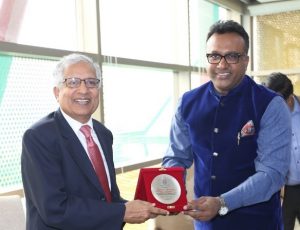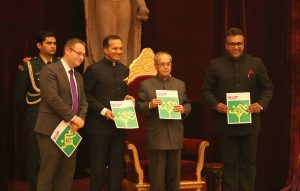New Delhi: Industry experts, academicians, researchers, judges, policymakers, scholars, and regulators from across the globe recently participated in a prestigious international conference on Standardization, Patents and Competition Issues. The International Conference on Standardization, Patents and Competition was organized by the Jindal Initiative on Research in IP & Competition (JIRICO) of O.P. Jindal Global University in New Delhi.
The forum took note of developments pertaining to issues of innovation and IPR policies; the role of standard setting organizations and competition agencies; FRAND licensing, emerging jurisprudence pertaining to SEPs and antitrust in the Asia-Pacific Region and Europe.
In her inaugural address, Smt. Pratibha M. Singh, Hon’ble Justice, Delhi High Court said, “India has witnessed 2G to 5G transition within a very short span of time. When it comes to adjudication of patent litigation, Indian jurisprudence, too, has evolved at a fast pace in the last few years. But it must be understood that luxury of time does not exist in IP litigations, as the life of most evolving technologies is very limited. With multiple patent owners and multiple standards emerging, legal disputes are inevitable. All such issues must be addressed expeditiously and whatever regulation emerges, at the end of the day, must be fair both to the innovator and the user.”
In his opening remarks, Prof (Dr.) C. Raj Kumar, Vice Chancellor, O. P. Jindal Global University said, “Intellectual property and patents are, necessary to foster technological innovation in the globalized world. But patent regimes in India and the world over, often, appear to be in conflict with evolving competition laws, despite the fact that both broadly are intended to enhance consumer welfare. Clarity and transparency on these issues and the evolving jurisprudence on this is the need of the hour. JIRICO has, in recent years, assumed a leadership role and initiated deep thinking on this.” The two-day conference, he said, would be a melting pot of progressive ideas to influence global policymaking on this and help scale new heights of excellence in the fields of intellectual property rights, competition and standardization in India.
Prof. (Dr.) Sreeram Chaulia, Dean, Jindal School of International Affairs pointed out that failure to comply with copyrights was the root cause of the cyber vulnerability as seen in recent WannaCry Ransomware attack. “The attack was a wake-up call for individual consumers, corporations, and governments around the world to invest more in ethical intellectual property. In this context, it is heartening to see international thinkers coming together to address and resolve issues around IPR and Competition Laws, under the aegis of JIRICO and JGU. With knowledge exchanges taking place at forums like this, we hope to have a better understanding of IPR, competition and standardization issues,” added Prof. Chaulia.
Sang Wook Kang, Hon’ble Judge, Seoul High Court, South Korea highlighted the application of Korean Fair Trade Act in violations of FRAND (fair, reasonable, and non-discriminatory) commitments by SEP holders in South Korea.
Elucidating the fact that new SEP holders have an obligation to negotiate faithfully, Judge Kang said, “In the light of standard development, unfairness is the intent to restrict competition. FRAND offers should make the methodology clear to derive the requested rates. We must strive to be more standardized and fair in terms of patents and IP, and discussions must be held pro-actively across countries in this regard.”
The objective of the conference, which was to initiate policy-level contemplation on competition, standardization and IPRs issues, was well served with intense and informed discussions spread over two days. Best practices and recommendations reflected upon by experts at the conference is likely to guide policymakers and international agencies.
Over 35 speakers from 10 different countries and 4 continents participated in the international forum.


